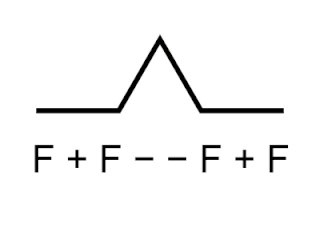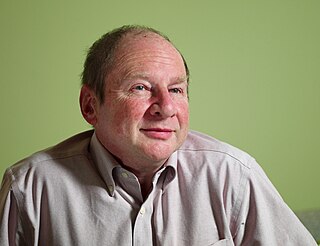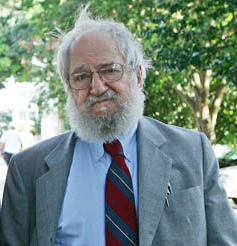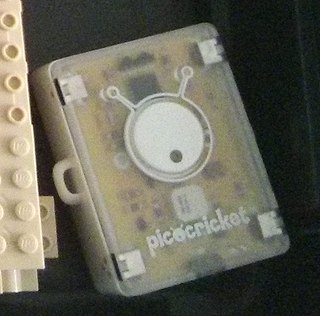
Logo is an educational programming language, designed in 1967 by Wally Feurzeig, Seymour Papert, and Cynthia Solomon. Logo is not an acronym: the name was coined by Feurzeig while he was at Bolt, Beranek and Newman, and derives from the Greek logos, meaning word or thought.

Seymour Aubrey Papert was a South African-born American mathematician, computer scientist, and educator, who spent most of his career teaching and researching at MIT. He was one of the pioneers of artificial intelligence, and of the constructionist movement in education. He was co-inventor, with Wally Feurzeig and Cynthia Solomon, of the Logo programming language.

Lego Mindstorms is a discontinued hardware and software structure which develops programmable robots based on Lego bricks.

Harold Abelson is a Professor of Computer Science and Engineering in the Department of Electrical Engineering and Computer Science at the Massachusetts Institute of Technology (MIT), a founding director of both Creative Commons and the Free Software Foundation, creator of the MIT App Inventor platform, and co-author of the widely-used textbook Structure and Interpretation of Computer Programs, sometimes also referred to as "the wizard book."

The MIT Media Lab is a research laboratory at the Massachusetts Institute of Technology, growing out of MIT's Architecture Machine Group in the School of Architecture. Its research does not restrict to fixed academic disciplines, but draws from technology, media, science, art, and design. As of 2014, Media lab's research groups include neurobiology, biologically inspired fabrication, socially engaging robots, emotive computing, bionics, and hyperinstruments.
StarLogo is an agent-based simulation language developed by Mitchel Resnick, Eric Klopfer, and others at the Massachusetts Institute of Technology (MIT) Media Lab and Scheller Teacher Education Program in Massachusetts. It is an extension of the Logo programming language, a dialect of Lisp. Designed for education, StarLogo can be used by students to model or simulate the behavior of decentralized systems.

Constructionist learning is the creation by learners of mental models to understand the world around them. Constructionism advocates student-centered, discovery learning where students use what they already know to acquire more knowledge. Students learn through participation in project-based learning where they make connections between different ideas and areas of knowledge facilitated by the teacher through coaching rather than using lectures or step-by-step guidance. Further, constructionism holds that learning can happen most effectively when people are active in making tangible objects in the real world. In this sense, constructionism is connected with experiential learning and builds on Jean Piaget's epistemological theory of constructivism.

The Clubhouse Network, often shortened to "The Clubhouse," is an American nonprofit organization that provides a free out-of-school learning program where children from lower-income communities can work with adult mentors to explore their own ideas, develop new skills, and build confidence in themselves through the use of technology. Its motto is "Where Technology Meets Imagination."

Scratch is a high-level block-based visual programming language and website aimed primarily at children as an educational tool, with a target audience of ages 8 to 16. Users on the site can create projects on the website using a block-like interface. Scratch was conceived and designed through collaborative National Science Foundation grants awarded to Mitchel Resnick and Yasmin Kafai. Scratch is developed by the MIT Media Lab. It has been translated into 70+ languages, and is used in most parts of the world. Scratch is taught and used in after-school centers, schools, and colleges, as well as other public knowledge institutions. As of 15 February 2023, community statistics on the language's official website show more than 123 million projects shared by over 103 million users, over 804 million total projects ever created, and more than 95 million monthly website visits.

The MIT School of Architecture and Planning is one of the five schools of the Massachusetts Institute of Technology in Cambridge, Massachusetts. Founded in 1865 by William Robert Ware, the school offered the first architecture curriculum in the United States and was the first architecture program established within a university. MIT's Department of Architecture has consistently ranked among the top architecture/built environment schools in the world.

Programmable Crickets, known commercially as PicoCrickets, are robotic toys in the form of programmable bricks. They are used to construct artistic projects.

MIT App Inventor is a high-level block-based visual programming language, originally built by Google and now maintained by the Massachusetts Institute of Technology. It allows newcomers to create computer applications for two operating systems: Android and iOS, which, as of 25 September 2023, is in beta testing. It is free and open-source released under dual licensing: a Creative Commons Attribution ShareAlike 3.0 Unported license and an Apache License 2.0 for the source code. Its target is primarily children and students studying computer programming, similar to Scratch.

Yasmin B. Kafai is a German American academic who is Professor of Learning Sciences at the University of Pennsylvania Graduate School of Education, with a secondary appointment in Computer and Information Sciences at University of Pennsylvania School of Engineering and Applied Science. She is a past president of the International Society of the Learning Sciences (ISLS), and an executive editor of the Journal of the Learning Sciences.

Cynthia Solomon is an American computer scientist known for her work in popularizing computer science for students. She is a pioneer in the fields of computer science, and educational computing. While working as a researcher at Massachusetts Institute of Technology (MIT), Solomon took it upon herself to understand and program in the programming language Lisp. As she began learning this language, she realized the need for a programming language that was more accessible and understandable for children. Throughout her research studies in education, Solomon worked full-time as a computer teacher in elementary and secondary schools. Her work has mainly focused on research on human-computer interaction and children as designers. While working at Bolt, Beranek and Newman, she worked with Wally Feurzeig and Seymour Papert, to create the first programming language for children, named Logo. The language was created to teach concepts of programming related to Lisp. Solomon has attained many accomplishments in her life such as being the vice president of R&D for Logo Computer Systems, Inc., when Apple Logo was developed and was the Director of the Atari Cambridge Research Laboratory. Solomon worked on the program committee of Constructing Modern Knowledge and the Marvin Minsky Institute for Artificial Intelligence in 2016. Further, she has published many writings based on research in the field of child education and technology in the classroom. Solomon has conducted workshops in elementary schools, high schools, and colleges regarding academic research and writing. She continues to contribute to the field by speaking at conferences and working with the One Laptop per Child Foundation.
Brian Silverman is a Canadian computer scientist, the creator of many programming environments for children, and a researcher in cellular automata.

ScratchJr is a visual programming language designed to introduce programming skills to children ages 5–7. The app is considered an introductory programming language. It is available as a free app for iOS, Android and Chromebook.

Natalie Rusk is a research scientist in the Lifelong Kindergarten (LLK) group, part of the MIT Media Lab at the Massachusetts Institute of Technology.
Paula Bonta is an Argentinian-Canadian computer scientist and educational software designer. She is known for developing programming environments for children, most notably contributing to the design of the Scratch programming language before it was even called Scratch. She co-founded the Playful Invention Company, a spin-off from the MIT Media Lab noted for developing the Programmable Cricket, with Mitchel Resnick and Brian Silverman and serves as Lead Designer. She was also the design director for several award-winning software products for children, including MicroWorlds and the "My Make Believe" series of products from Logo Computer Systems, Inc. She has a degree in computer science and a graduate degree from the Harvard Graduate School of Education.
Marina Umaschi Bers is the Augustus Long Professor of Education at Boston College. Bers holds a secondary appointment in Boston College's Department of Computer Science. Bers directs the interdisciplinary DevTech Research Group, which she started in 2001 at Tufts University. Her research involves the design and study of innovative learning technologies to promote children's positive development. She is known for her work in the field of early childhood computer science with projects of national and international visibility. Bers is the co-creator of the free ScratchJr programming language, used by 35 million children, and the creator of the KIBO robotic kit, which has no screens or keyboards.















